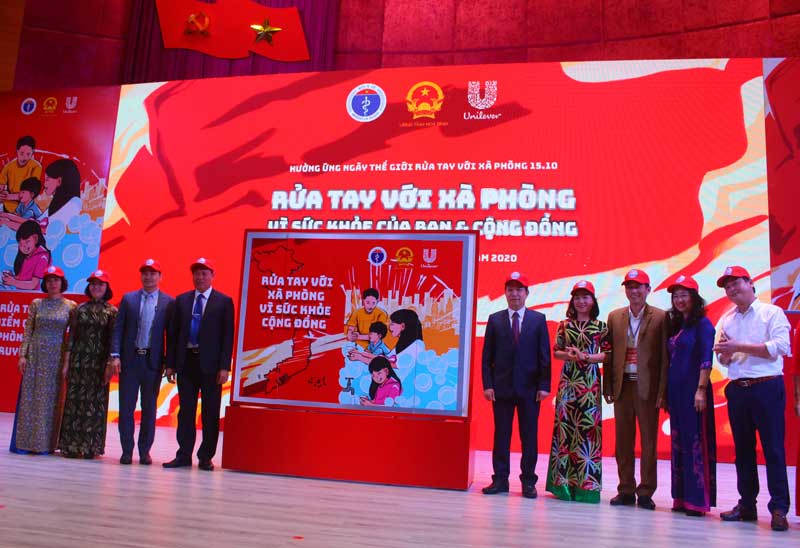
(HBO) – A meeting to respond to the Global Handwashing Day was held at the HoaBinh Culture Palace on October 18 by the Ministry of Health and Unilever Vietnam Foundation, in collaboration with the provincial People’s Committee.
 Delegates
engage in a mosaic puzzle as part of thecommunication activities on washing
hands with soap.
Delegates
engage in a mosaic puzzle as part of thecommunication activities on washing
hands with soap.
The meeting drew 600 delegates, including
representatives from the Ministry of Health, Unilever Vietnam Foundation as
well as a number of central ministries, sectors and agencies, and the Disease
Control Centres of a number of localities.
HoaBinh delegates included Nguyen Van Toan,
Vice Chairman of the provincial People’s Committee, representatives from departments
and agencies, and students from primary to high schools in HoaBinh city.
In order to raise public awareness of washing
hands with soaps, in 2008, Global Handwashing Partnership proposed the designation
of October 15 as the Global Handwashing Day. Since then, in mid-October every
year, the Ministry of Health coordinates with central ministries and sectors
and the People’s Committee of localities to hold meetings to respond to the event.
This year, HoaBinh was selected as the host.
This year, the Global Handwashing Day is
themed "Hand Hygiene for All”. At the meeting, participants updated the
significance of proper handwashing with soap and recommendations on the
maintaining of the habit in 10 importantmoments to prevent epidemics,
especially amidst the global spreading of COVD-19 pandemic.
Addressing the event, Deputy Minister of
Health Do XuanTuyen and Vice Chairman of the HoaBinh People’s Committee Nguyen
Van Toan highlighted the significance of environmental sanitation and personal
hygiene in epidemicprevention and control.
In the future, Party committees and local
administrations as well as organisations and agencies, offices, schools and
healthcare facilities should build and issue policies, regulations and guidelines
on building and maintaining handwashing facilities to ensure all people get
easy access to the facilities.
At the meeting, the organisation board
presented more than 800 gift packages comprising handwashing soaps, shower gel
and hand sanitisers to participants and five schools in
HoaBinh city./.
More than just an information technology teacher, Bui Van Nien is an inspiring figure who has nurtured the scientific curiosity and creative spirit of students in Vietnam’s ethnic minority communities.
Da Bac is the most disadvantaged mountainous district in Hoa Binh province, with ethnic minorities accounting for about 90% of its population. Over the past years, the district has mobilised resources to implement ethnic policies to improve the quality of life of local people.
In recent years, Hoa Binh province has consistently prioritised the protection, care, and education of children, particularly those from ethnic minorities and disadvantaged backgrounds, by creating a safe, healthy, and nurturing environment for their all-round development.
The Steering Committee for Tobacco Harm Prevention and Control of Hoa Binh province, in coordination with the Tobacco Harm Prevention and Control Fund, held a ceremony on May 28 in response to the World No Tobacco Day (May 31) and the National No Tobacco Week (from May 25 to 31). The event was chaired by Nguyen Van Toan, Standing Vice Chairman of the provincial People’s Committee and head of the Steering Committee.
Since 2021, the Center for Industrial Promotion and Industrial Development Consulting (CIIDC) under the Department of Industry and Trade has been implementing a school lighting model as part of the plan for using energy efficiently and economically in Hoa Binh Province in the pẻiod of 2021 - 2025. This model not only aims to improve the learning conditions and enhance the education quality, but it also promotes the message of energy saving, energy security, environmental protection and contributes to the goals of socio-economic development.
In the 2024 - 2025 school year, the entire Hoa Binh provincial education sector includes 520 educational institutions and schools. Among them are 13 ethnic boarding schools with 153 classes and 4,487 students. Four of these schools have met national standards, reaching 30.7 percent.



 Delegates
engage in a mosaic puzzle as part of thecommunication activities on washing
hands with soap.
Delegates
engage in a mosaic puzzle as part of thecommunication activities on washing
hands with soap.